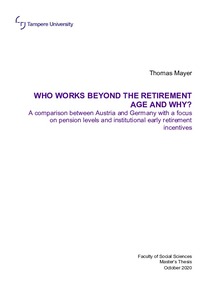Who works beyond the retirement age and why? : A comparison between Austria and Germany with a focus on pension levels and institutional early retirement incentives
Mayer, Thomas (2020)
Mayer, Thomas
2020
Master's Programme in Global Society
Yhteiskuntatieteiden tiedekunta - Faculty of Social Sciences
This publication is copyrighted. You may download, display and print it for Your own personal use. Commercial use is prohibited.
Hyväksymispäivämäärä
2020-11-20
Julkaisun pysyvä osoite on
https://urn.fi/URN:NBN:fi:tuni-202010307739
https://urn.fi/URN:NBN:fi:tuni-202010307739
Tiivistelmä
Facing demographic ageing, Germany and Austria have reformed their old age security systems to be sustainable for the future. With reforms starting at the turn of the century, a trend towards later retirement has been set by these governments. Especially interesting for governmental bodies is the question, which factors determine retirement after the statutory pension age. Germany and Austria promote late retirement in order to keep their pension systems sustainable, despite having cut the benefits of their public pension systems drastically since the early 2000s. Using wave 7 of the Survey of Health, Ageing and Retirement (SHARE), this thesis compares Germany, Austria and a sample of all SHARE countries to determine which individual, occupational and institutional factors affect late retirement significantly. The results show that a key characteristic of determining retirement timing is age. The older a population gets, the more likely retirement is. This is especially true for Austria. Among German citizens, receiving public pension benefits decreases the odds of having income from gainful employment dramatically. Further, comparing both countries with the SHARE sample, a pattern for educational attainment is visible. The data shows that the odds of working in retirement increase significantly with a medium and high level of education.
